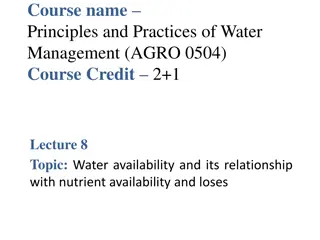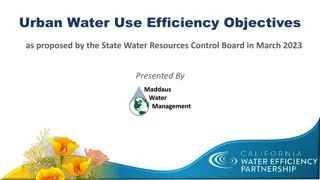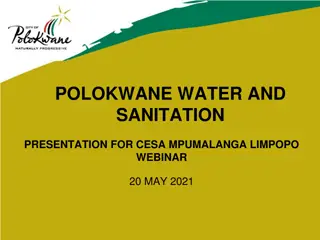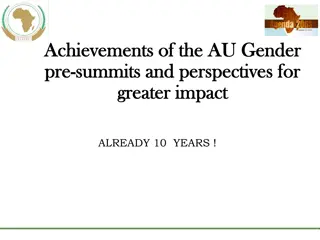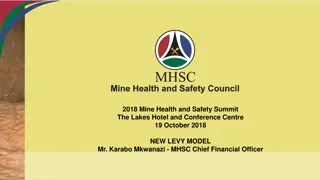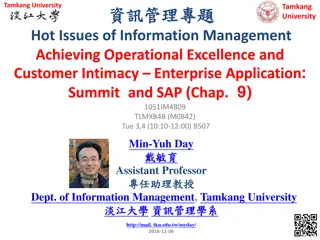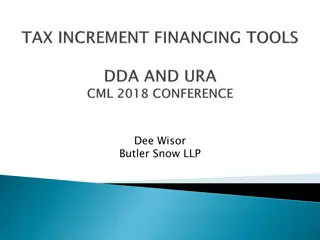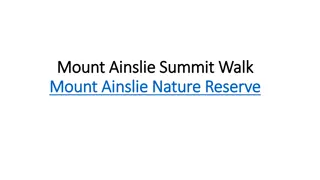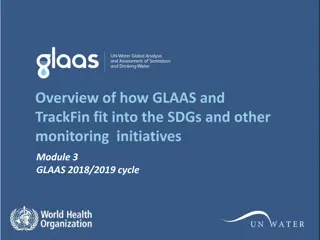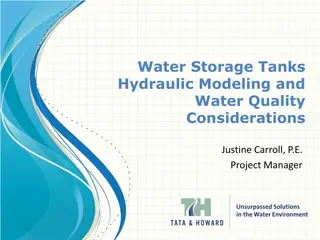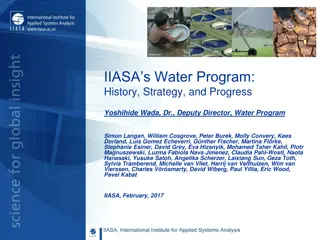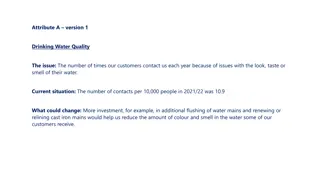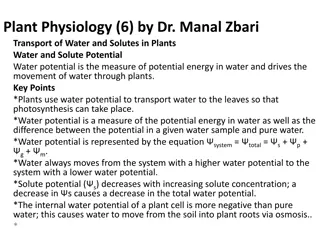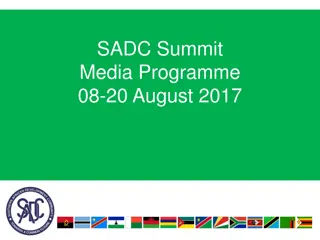AWSISA Introduction to Water Services Authorities Summit
AWSISA aims to support water and sanitation institutions in South Africa by providing advisory services, fostering partnerships, and promoting innovation. The association seeks collaboration with Water Service Authorities in areas such as water demand management, performance monitoring, and water quality monitoring. Through its activities and partnerships, AWSISA strives to enhance the sustainability and effectiveness of water services in the region.
Download Presentation

Please find below an Image/Link to download the presentation.
The content on the website is provided AS IS for your information and personal use only. It may not be sold, licensed, or shared on other websites without obtaining consent from the author.If you encounter any issues during the download, it is possible that the publisher has removed the file from their server.
You are allowed to download the files provided on this website for personal or commercial use, subject to the condition that they are used lawfully. All files are the property of their respective owners.
The content on the website is provided AS IS for your information and personal use only. It may not be sold, licensed, or shared on other websites without obtaining consent from the author.
E N D
Presentation Transcript
Introduction of the Association of Water and Sanitation Institutions in South Africa (AWSISA) to the Water Services Authorities Summit and possible areas of collaboration. 19 Jan 2023
Contents 1. Purpose of the Presentation 2. Objectives of AWSISA 3. Collaborative Effort between AWSISA and WSAs 4. AWSISA Activities in support of WSAs 5. AWSISA Capacity in relation to Focus Areas 6. Partnerships of AWSISA 7. Conclusions 8. Way Forward
1. Purpose of the Presentation Introduce AWSISA to the Water and Sanitation sector and indicate the possible areas of collaboration in support of the Water Service Authorities (WSAs). Represented in AWSISA are institutions that play a role in integrated Water Resources Management (IWRM). AWSISA has been registered with the Companies and Intellectual Property Commission and is currently under operationalization. AWSISA: I. pursues the interest of the Water and Sanitation Institutions across the Value Chain. II. provides an Advisory Role to the Sector on all matters from an IWRM perspective. III. fosters Intra and Global Partnerships among the members.
2. Objectives of AWSISA The primary objective is to support the mandate of the Department of Water and Sanitation (DWS) whilst pursuing the common interests of the institutions along the water and sanitation value chain. AWSISA has the following objectives: I. Local Government Support. II. Participation in DWS Strategic Programmes. III. Input in legislative and Policy Formulation. IV.Fostering sustainability of Water and Sanitation Institutions. V. Leading Innovation, Research and Development Programmes.
3. Collaborative Effort between AWSISA and WSAs AWSISAandWSAscouldcollaborateinthefollowingareas: I. SupporttoWSAsiskeytotheirabilitytogiveeffecttotheirConstitutionalMandateofwaterservicesprovision. II. WaterBoardshaveplayedtheroleofWaterServiceProviders(WSPs)overmanyyears. III. Waterdemandalreadyexceedswatersupplyfromaqualitativeandquantitativeperspective. IV. Excessive water demandresults from population growth, industrialisation, inadequate level of investment in maintenance, increaseinnon-revenuewaterandshortageofskills. Furthermore,thefollowingwouldbeamongsttheconsiderationsbyAWSISAandWSAs: I. Settingoffairandequitablesupplytargets. II. Monitoringandcommunicationofperformanceagainstlicensedtargets. III. DefiningfocusareasforWaterDemandManagementinterventions. IV. Reviewofwaterdemandinterventionsbymunicipalitiesandmonitoringofprogress. V. Determinewaterconservationmeasures,likeeffluentreuseandacidminewaterdrainage.
4. AWSISA Activities in Support of WSAs AWSISA can provide support to WSAs in: I. Real-time water quality monitoring. II. Local Government Support (e.g. Emfuleni Local Municipality). III. Institutional Realignment and Reform Programme implementation. IV. Participation in International Progammes (e.g. joint attendance of Conferences and Congresses, Bi-National Commissions, Watercourse Commissions, etc.) V. Input into the National Water Resources Strategy 2 (NWRS2). VI. Input into the State Holding Company Bill. VII. Tariff determination process. VIII. Debt Management Programme in relation to Municipalities. IX. Sustainability of Water and Sanitation Institutions. X. Innovation, Research & Development.
5. AWSISA Capacity in relation to Focus Areas No Work Stream (WS) Convenor/ Alternate Focus Area Infrastructure, asset & project management Rand Water/ Overberg 1 Technical WS Tariffs, Debts owed to Water Institutions, Membership Fees & Budget TCTA 2 Finance WS Water Research Commission/ Rand Water Innovation, Research & Development in the Sector Innovation, Research & Development WS 3 UMngeni-uThukela Water/ Breede Gouritz CMA MOI, MoUs, Industry risks & legal matters, IRR, Audit & Compliance Legal & Risk Management WS 4 Human Resources / Labour Relations WS Magalies/ Amatola Water Employee Relations 5 Vaal Central Water/ Lepelle Northen Water Partnerships (Global & local) WS Twinning Programmes 6 Water Resource Management Catchment Management Agencies Water Resource Management 7
6. Partnerships of AWSISA I. AWSISA is amenable to partnerships with Development Financial Institutions (DFIs) and Commercial Banks. II. AWSISA has a strong combined Balanced Sheet. III. AWSISA supports Public-Public Partnerships. (Section 19.2 of WSA Act 108 of 1997 IV. AWSISA represent the most stable SOEs
8. Way Forward I. Water and sanitation institutions should be at the centre of Integrated Water Research Management in support of the DWS mandate. II. Partnerships between WSAs and WSPs to be based on the Water Board model within the framework of Section 19(2) of the Water Services Act no. 108, 1997 that is the SPV model III. AWSISA to be involved in leveraging Project Financing through structures such as TCTA and others. IV. AWSISA membership to play a pivotal role as implementing agent in capital projects in terms of Section 63. This can be an immediate intervention. V. AWSISA membership to lead innovation, research and development projects through structures such as WRC and share knowledge with WSAs VI. Tariff setting determination to include AWSISA VII. DWS and National Treasury to intervene over municipal debts like Eskom debt intervention in favor of Water Boards. VIII. Water Boards to guide or assist WSAs on IDP as it relates to Water and Sanitation Services IX. Assistance with professionalisation of WSA authorities to meet regulatory requirements like regulation 360 on process controllers.
7. Conclusions I. AWSISA has built innovation, research and development capabilities. II. Water and sanitation institutions have jointly accumulated extensive experience and expertise in IWRM. III. Pooling of resources from within AWSISA can be leveraged in support of the sustainable management of WSAs.

 undefined
undefined



 undefined
undefined






